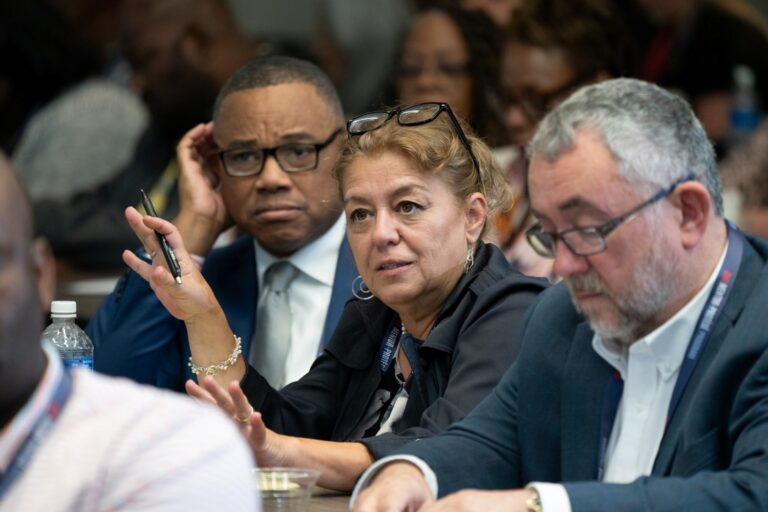Grant Thornton on Acing the Disruption Game as an Industry Leader
Serving private and public middle-market companies, Grant Thornton is well-known for its global present as an accounting and management consulting firm. With about 50 offices in the United States and other 109 countries, the firm ranked just below the Big Four.
The company said it’s been helping of both government agencies and commercial clients in many sizes for 35 years, by providing services in accounting, audits, tax matters and business strategies. Along with PRIMA (People and relationship Issues in Management) – a 12 points framework that identifies problems in family and owner-managed businesses and recommends potential solutions.
How organizations can unlock its potential and growth thanks to the firm’s forward-looking advice, outlooks and new vision on the industry and many meaningful lessons the firm’s leadership team is practicing, and nurturing is what we are seeking today.
Embracing Industry Disruption as the Only Way to Win
Started out working at Arthur Anderson, then joined Grant Thornton around 2002 as its United Stated CEO and just retired earlier this year, Mike McGuire was named as one of an old oak leader of Grant Thornton and also of the accounting industry.

It’s not only the 19 years that he had spent with the firm, but also how he is identified. People knowns McGuire for his teams and the phenomenal job that he contributes to the company’s and clients’ growth. How did he get there, especially in time of changes and while disruptions are happening everywhere?
McGuire recalls as an CEO; you must always have in your pocket a five-point plan that is ready to drive as the company’s strategy. You got the structure in line and got the right people in place for that mission. And all of a sudden, somewhere along the course of your five-year plan, industry disruptors start growing crazy.
Particularly in the accounting space, which is already 100 years old, “the industry actually started around 1913 when the federal government passed a federal tax act and it was enhanced at 33 and 34 of the securities acts where everybody had, public companies had to file registered statements or statements with the SCC,” McGuire explains.
When changes did happen but at a pace where everything is under control, but for now disruptors are making its way across industries. It’s crucial for leaders like big players to stay focus and be market sensitive. McGuire remembers the questions then was: “How do you change a culture in an environment like accounting firms where it’s not a changing industry?”
Wanted to be able to lead disruption in his space, the CEO rapidly came up with something called Status Go, “I felt like we had to get the organization ready for change. I like our culture, but then we had to do something different.”
Status Go – this approach, McGuire explains, means to change the firm’s status quo with speed. If there was a Word Association game, people would never align the word “accounting” and “speed” to make a relation. But at the time being, that is what Grant Thornton team and McGuire has to do.
They are trying to accelerate the transformation of their industry to address the disruption, McGuire wants to be in the front of that.
“By not tapping on the breaks like we are afraid of it, but we want to hit the accelerator so that we can embrace the disruption”
And all of that embracement has to start by getting the right culture to accept that kind of change and that pace of change – that is the first phrase, you and your organization has to made up together before entering the bigger and more serious realm.

Make Yourself Client Zero
As entrepreneurs and business leaders, we do aware of how Software as a Service (SAAS) companies are the professional players of the future as they are giving away so much of their intellectual capital. Is this the kind of speed the CEO mentioned and what is the right mindset to approach this techy adaption?
McGuire claims does not matter what kind of innovation the world is making, yours should only be ones that your clients expect. Go out there and experiment with new technology, new processes, new ways of doing business and bring it home to perfect it for your people and your clients.
Make yourself client zero!
However, your organization should be the first one to be served, treat yourself as the “zero” client and ask, “what are some things that you can do to improve the way you run your business, the way we engage with our people?” if you can serve yourself well, people would notice and trust your service. And especially, the new technology and advance product you’re bringing to the table.
The CEO remembers back when he was with Arthur Anderson firm, not everybody had their personal computers yet, and they were still doing a lot of stuff on paper. Then Anderson started to be the early adopter on Microsoft platform, and to be the first one globally has lotus notes.
Showing up to clients with the latest technology has empowered him to answer any questions, even the minor things. The point is clients could be asking anywhere, but they are turning to you for answers. So, that is what he was trying to make happen at Grant Thornton – to be in front not only of the peers but also clients.
Throwing Money at the Problem
The right changes are made only when you found the right problems. At the firm, McGuire says they were taking a very unique approach towards problem. And promote problem-solver not just by throwing money at them. “It’s easy to talk about robotics process automation and things like that. It’s hard to apply it,” McGuire claims.
What was wrong about their organization or any other traditional firms, according to McGuire, is because of its lack of silos and this permission to bring in a team of people from various disciplines, a diverse team of people to try to look for problems and solutions.
If you think about it, public accounting, and professional services in lot of cases are shaped like a pyramid, all good ideas come from the top, and go downward. So, what he was trying to do is to flip that pyramid around and run it like a funnel. Getting the young people, the creative and talented ones in, with their original perspectives and voices. Filled the funnel with those fresh ideas and make it flows downward. That’s the only way for unique solutions to be found and the only how you could see disruption happens.
Culture That Resonates with the Century
Mentioned the young and changes, besides upgrading products and visions, organizations cannot leave aside the important of cultivating new culture that would resonate with new spirits of upcoming workforce. At the same time, nurturing the core value that your company stands for. So, what is that key trait in Grant Thornton’s culture that its people think is mattered most?

“Certainly, at the top of our list is quality,” McGuire addresses. If you get the quality right in the first place, it would beautifully cascades, but to get that desired quality is not that simple.
In McGuire’s way, if you want to have a quality result you, first, have to make sure you’ve got a very diverse team and the right people to be able to bring that quality into being.
And underpinning all of that is collaboration. You cannot put the right team together unless you have articulate collaboration. The logical step would be, first you give diversity a thought, which leads to curiosity and then more creative solutions would come as a sequence. That’s how it cascades!
And there will be two outcomes of this, clients would be happier and also your people. As they are getting different experiences they would be engaged and feel like their potential are being unleased.
“It just feeds on itself. We’re tipping out culture now to innovation, but you don’t have innovation without curiosity. I would say Thomas Edison was a highly curious person. I would say Jeff Bezos is a highly curious person.”
If you’re constrained in your thinking or feel like you have limitations, and you can only touch things that you’re assigned to do, and you will do the same thing over and over and over again. Constricting people’s thoughts and restricting the things they can do and confining them is certainly not something that is conducive to a culture of curiosity, which then leads to a culture of innovation.
Quite honestly, a culture where the people are highly engaged and feel valued and feel like they can experiment and have fun and grow and develop. Try to nurture and cultivate the kind of culture that your clients would benefit from.
Admire Yourself
Last reminder from the CEO, McGuire says, as business leaders, he always has his guard up and navigate in the unknown, to look out for his organization and somehow for his industry. As tiring as it is, but that’s any leader’s duty.
So, it’s crucial for people like him, the navigators to sometime look back and admire themselves as well as the past journey.
“I sit back and admire the things that my teams do and the kinds of things that our clients say about them.”
At some point, he advises, you have to call time out, just stop for a minute and just look back over the last years to see what the firm has accomplished and cherish the hard work a lot of people had devoted.
“We’re always looking forward, which is the thing you need to do, but sometimes I think it’s good to take a stop or a little rest and look back with your team and celebrate the accomplishments of everybody at the organization.”
Amazing culture and practices have made it way to take the company where it needs to be, and while corporate sustainability is talked about as an urgent issue. Grant Thornton’s leader team does have their bold action to stress this matter.
Woman-Lead Advocate to Stress Corporate Sustainability

Barriers are broken down and how woman are making their ways to the top is no longer a new story. The company, somehow, is an advocate of this tidal surge as Peter Bodin – global CEO of Grant Thornton in early 2020 presented the “Women in Business” IBR report.
According to the global survey, the percentage of business with at least one woman in the senior management is now equal to 87%, counted for 12% increase from 2018. To Bodin, this indicates a clear progress in one of the key-aspects of corporate sustainability.
“Nowadays businesses,” the leader says, “need leaders with different perspectives and point of views. A business with no gender balance cannot be sustainable. As a leader of this network, I keep on stressing the importance of having a diverse leadership, with more women in key roles. This is now happening and it’s a vital part of what we do.”
Seeing how female corporate leaders are rising to the challenges of leading, especially during crises. Joy Taylor – National Managing Principal in Grant Thornton’s Organizational and Operational Transformation practice has hosted a conference featuring women executives during which they talk and explore many successful leadership practices.
#1 Deliver Returns in Times of Rough Waters
In this, Taylor has Carolyn Burke, an CFO of Chevron Phillips Chemical within oil, gas, and energy industry to share her confidence in the past pandemic.
Burke described her vision approach this challenging time how to deliver returns not only in times of smooth sailing but also in rough waters. and is trying to instill that in folks. “When times are good, market are up and the economy is rocking along, folks tend to be more optimistic. You should, in some sense, reverse those behaviors.” Everything is periodic and its business leaders’ responsibility to take advantage of both highs and lows.
To Burke the opportunities in economic downturn, include lower prices, less aggressive competitors and openings for Merger and Acquisitions. “If the habit of preparation becomes a practice and a mindset, you are going to be able to move quickly,” she advises.
Even advocating for a counterintuitive perspective, Burke proves this to be an effective approach, “learning to manage in uncertain times and leading through ambiguity and volatility are a unique skill set and experience. Bringing teams through an uncertain path with confidence, humility and at times failures will make you and your team stronger.”
#2 Adopting an Unwavering Focus
Another vital practice for your business is adopting an unwavering focus, said Erin Horvath, President of Distribution Services, AmerisourceBergen Corporation.
Which means be ever ready to evolve your teams and yourself in all circumstances. Double-down on strategy, as you can get very consumed with the day-to-day, but as leaders you are driving the ship. So, make sure with that five-year plan you are down for great commitment and so does everybody that is joining the war.
Horvath advises, as women and leaders, you have to bring your voice to the table and ensure the team is aspire the same dream the same future as you are. In this case, do not make grand statement with corporate literature, because what matter is things that happens on the ground.
The question is whether staff, from the most senior to the most junior, recognize your commitments and strategies as being played out on a day-to-day basis.
The Bottom Lines
Culture is no rocket science. It takes a concerted and conscious effort to that must be nurtured, cultivated, and lived over time.
Along this reading journey with Grant Thornton, we know it’s about engendering a team spirit, taking pride in our work, and focusing on being the very best that we can be. Beyond that is how the game is shifting itself toward women leaders and its only getting more and more excited.









